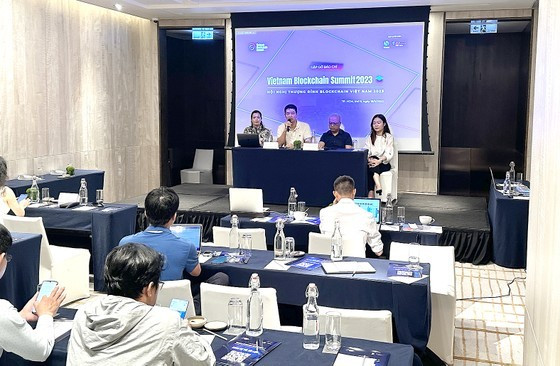 |
|
VINASA and Vietnam Blockchain Association are holding a press release for Vietnam Blockchain Summit 2023 |
Chairman Hoang Van Huay of Vietnam Blockchain Association is proud that his organization has greatly contributed to popularizing this useful technology nationwide. In addition, technological enterprises are accelerating the training of blockchain human resources to work in major fields and in universities.
One typical instance of blockchain implementation is MeInvoice.vn, the e-invoice software developed by Misa Co. with a higher security and safety level and invoice anti-counterfeiting. Blockchain has been used to record and update all necessary invoice information and statuses so that partners can check and authenticate these data easily. The software has received extremely positive comments from domestic companies.
Another successful application of the technology is an unsupervised e-wallet integrated into Coc Coc internet browser and search engine to promote the adoption of Web3 as well. This e-wallet will be available in Coc Coc on all platforms of PC, MAC, iOS, and Android so that users can conveniently and safely manage their secret keychain.
FPT has also developed its akaChain platform to identify its clients and trace transactions. Viettel is using blockchain in medical e-records. The banks of BIDV, MB, VPBank, and Vietcombank are applying it in their financial transactions.
Vice Chairman Mai Duy Quang of Vietnam Software & IT Services Association (VINASA) said that blockchain has various implementations even in the piloting time. This technology will have important effects on multiple fields.
Blockchain has been chosen by many countries to be the key technology for economic development. Vietnam is considered a leading market for blockchain in the world with over 10 startups based on it. This market is forecast by experts to reach the value of nearly US$2.5 billion in 2026.
In particular, in the education field, blockchain makes it much easier to detect a fake certificate. In daily operation, businesses can monitor employees’ current activities and their work performance. As to digital signature, blockchain helps to minimize fraudulences when sending documents and mails online because it ensures objectivity as there is no third-party interference.
One of the greatest challenges to develop blockchain in Vietnam is no clear legal basis in this field, which is a serious barrier for its implementation.
At the 1st anniversary of Vietnam Blockchain Association, Deputy Minister of Science and Technology Tran Van Tung recommended that the association research and prepare a proper proposal to state agencies to introduce a legal basis for blockchain as soon as possible. Along with that are supporting policies for the use of this technology in establishing big data to serve digital transformation purposes. Blockchain human resources training should receive much attention so that Vietnamese programmers have the same level as their international counterparts, easily creating domestic and foreign networks.
According to Decision No.2117/QD-TTg, issued on December 16, 2020 by the Prime Minister, blockchain research and development in Vietnam are prioritized in order for the country to actively participate in Industry 4.0. The Ministry of Science and Technology has also approved the national key science-technology program until 2025, clearly stating that blockchain stays in the second priority position, preceded only by AI technology.
Blockchain has gradually become a pillar for Vietnamese technologies with many attractive applications such as a qualification storage platform in the education field, letters of credit and contract or payment guarantee in the banking field. Obviously, this technology is more widely accepted as a useful one, not merely cryptocurrency as it was previously thought.
Source: SGGP